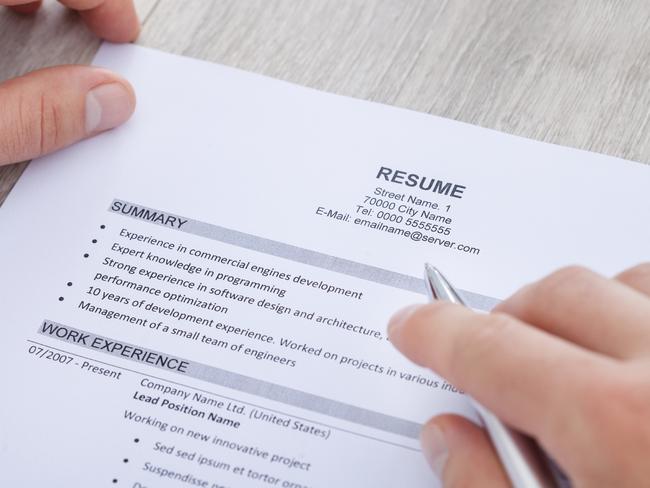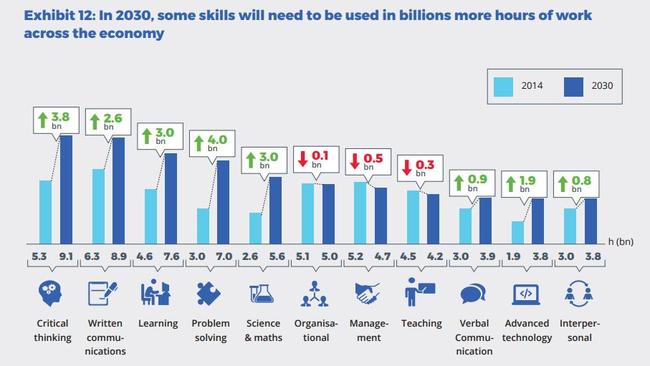Millennial vs. Machine: Skills young Australians need to compete with automation
MILLENNIAL jobseekers already have to fight for a shrinking number of jobs. Soon they’ll have to fight against machines.
ALREADY having to beat out unprecedentedly qualified competition for a shrinking number of positions, millennial jobseekers have it pretty tough.
Young Australians have to battle for the one job there is for every four graduates, and studies show they’ll get to go through the same torturous process 17 times across five different fields as changing jobs and industries becomes more and more common, and necessary.
Think things couldn’t get worse? We have some bad news.
Pretty soon, Aussies entering the workforce will not only have to worry about the human competition, but machines as well.
As automation takes over traditional jobs at an alarming rate, young workers are having to prove their skills against robots and convince employers they have something ever-improving technology doesn’t.
There is a sliver of hope, according to the University of Melbourne’s Centre for Workplace Leadership senior research fellow Dr Josh Healy. He says there is a class of skills which technology will never be able to adopt, and these are the areas employers are increasingly focusing on.

For decades, workers could easily slot into a class of jobs across numerous industry where a person even without a graduation qualification could gain a reasonable middle-class income and job security from work that wasn’t varied and mostly predictable — think blue collar and clerical jobs.
Dr Healy says a lot of those jobs just don’t exist anymore and have already been taken over by new technology.
“What that means is the requirements for people to do routine jobs are drying up and employers are shifting their emphasis more heavily into a class of skills that machines can’t do and can never do,” he says.
“We see a lot written about robotics and automation threatening jobs, but these technologies remain somewhat narrow in their capabilities and don’t have the capability to recognise patterns, make leaps in logic or learn from their experiences.
“These are among a class of skills that we’re loosely calling soft skills, and that’s where the focus has shifted.”
While employers used to focus on box-ticking qualifications and work records that proved they could do what would be required of them in a job, employers are now looking beyond those.
Those qualifications are still important, but bosses want more.
“We’re still going to recognise that technical skills and technical knowledge is important — we haven’t ditched that — it’s more that it’s increasingly not enough,” Dr Healy says.
“We’re producing a lot more graduates nowadays. We’ve almost got a glut of people with degrees who employers would assume have the minimal technical confidence in their field. Because there’s so many people with that base of knowledge, employers are moving up the pyramid of requirements, and thinking, ‘I’ve got all these people, what else do I want?’”
To find out exactly where employers are shifting their focus to, news.com.au spoke to employers from fast-growing and adapting Australian employers.

ADAPTABILITY
Andrea Ingham is head of sales at Spotify Australia and New Zealand, and says when she hires staff, she need to know they’re qualified for the job they’re applying for, but also that they can handle how that job is going to change.
“We’re always looking beyond the hard skills which we are given on someone’s CV,” she says.
“They’re the kinds of things that tick the box and get a candidate to the interview or considered further, but they need to prove they can handle more than what the role demands, because the role is inevitably going to develop and change.”
Working in an agile and changing industry, Ms Ingham says jobs within the business grow and change too.
“We’re probably a little ahead of the curve at Spotify. We’re a much smaller remote office of a large global business, so we need resilient staff who can adapt to a dynamic work environment.”
AUTONOMY
Part of the way work is changing, Ms Ingham says, is that offices are less structured and unusual hours and travel are much more common.
“We look for people who can work autonomously, because we work in a dynamic work environment where we give people autonomy either from the office or from home or while travelling. It’s really important to be able to manage themselves,” she says.
“They’re probably not going to have quite as much direction from a line manager, so it’s really important to be able to self-direct.”
COMMUNICATION
“Working remotely, you can become a little disconnected, so communication is a big one,” Ms Ingham says.
“While it seems like automation and working remotely might make those skills less necessary as there’s less face-to-face contact, what we’re seeing is relationships actually become more important, because the communication we do have is crucial.
“Relationships matter and always will.”
Cotton On Group’s careers manager Jo Barr says that while technology has stripped away a degree of communication involved in recruiting new candidates, it’s become the most crucial element of the interview process.
“We use technology to screen candidates from a huge volume so that we can be sure they have the qualifications or experience that we require, but it’s from five minutes with someone you can tell the things that really matter, and that’s if they’ll be a cultural fit. That’s the most important thing,” she says.
“The interaction you have with a company through an application process, even from the moment we speak to somebody on the phone to arrange an interview, and how they approach reception for the first time, if they come into the store are they looking around, are they interested in the product — those are the things that we take notice of.”
INITIATIVE
“Clear goals, asking for advice, and asking for leadership is your key to unlock success,” Ms Barr says.
That means being able to confidently communicate ideas, and offering suggestions for how your role, and potentially the wider business, can adapt.
“The most impressive thing a worker can do, in those moments of being honest about how they think they’re going or where they are headed in the business, is to bring ideas,” she says.
Strong ideas are something that will never be automated.
INTEGRITY
While there are a raft of skills that Ms Barr says are essential to every single role, integrity is the most important to her. It can also be the trickiest to judge.
“If anybody’s lied on their CV or been devious, that’s the biggest turn-off,” she says.
“As much as I appreciate interviews are about showing that best self, we want the real self.
“I’ve had people who are very good at talking themselves up but in a 15 or 20-minute chat have let something slip that indicates they’re perhaps not being truthful.”




